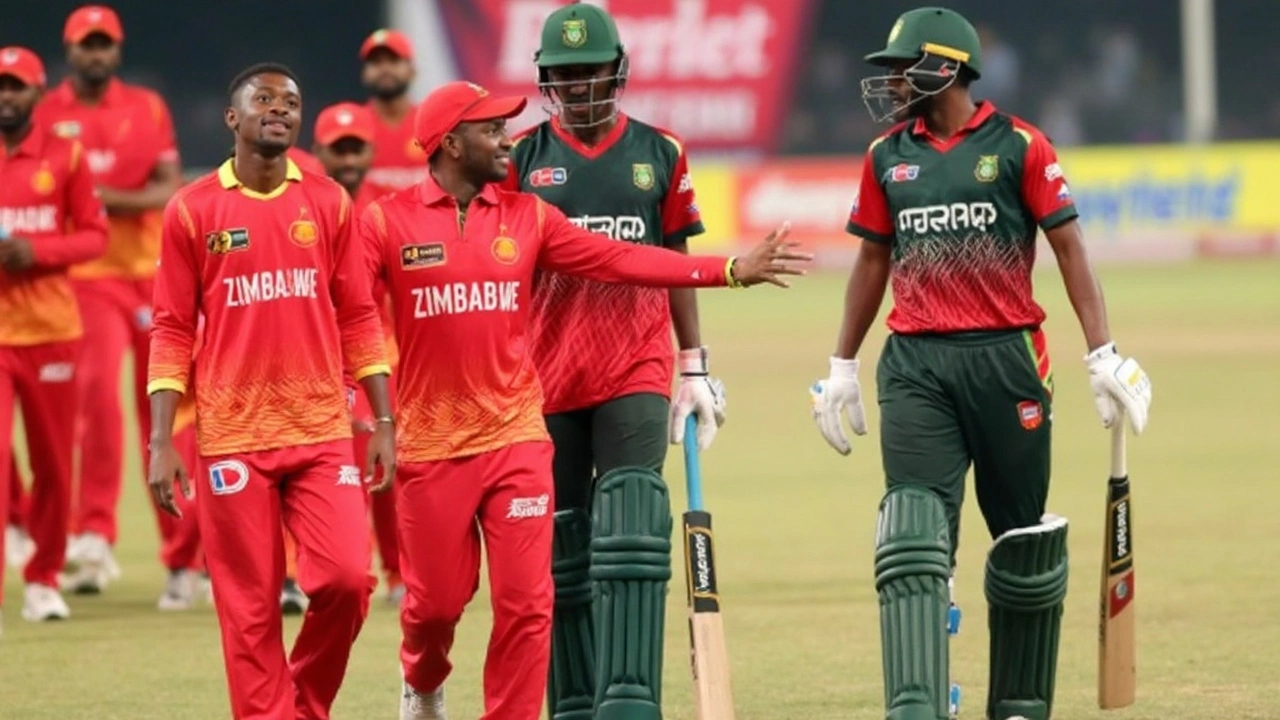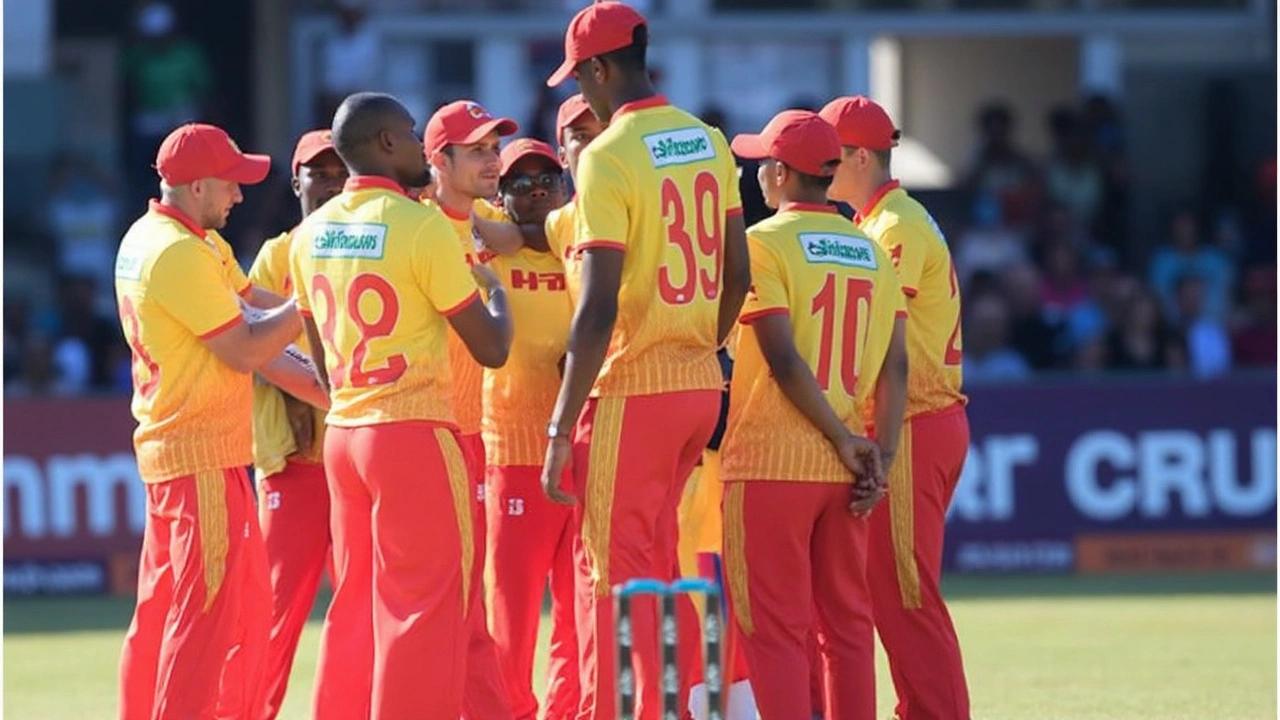Zimbabwe vs Bangladesh: Hosts Secure Vital 23-Run T20 Win in Harare to Level Series

Zimbabwe Bounce Back with Convincing Win Against Bangladesh
No one expected such a twist in Harare after the drubbing Zimbabwe took in the first T20I, but Friday’s match flipped the narrative. Zimbabwe hosted Bangladesh for the second game of their three-match T20I series, and this time, the atmosphere buzzed with both anticipation and nerves after the home side won the toss and chose to bat.
The opening overs saw Zimbabwe in a spot of bother. Wickets had tumbled early in their previous matches, raising familiar alarm bells. But Wesley Madhevere had other ideas. Gritting his teeth, the young right-hander launched a forceful counterattack. His innings—73 off just 57 balls—mixed sharp placement with moments of pure invention; boundaries arrived just as fielders tried to apply the brakes. Madhevere’s knock anchored Zimbabwe through wobbly stretches, but it wasn’t a one-man show for long.
As Bangladesh’s bowlers turned the screws, the middle order faced a tough squeeze. Yet Ryan Burl stepped up right when Zimbabwe needed it most, piecing together a stubborn 34* not out. Burl’s late-over composure took the hosts from a shaky middle phase to a competitive final score. With just six wickets lost, Zimbabwe finished at 166, a total that looked within reach on a good Harare wicket but would require discipline to defend.
From the Bangladesh side, left-arm pacer Shoriful Islam stood out. He picked up three wickets for 33, using clever angles and sharp Yorkers, keeping Zimbabwe in check even as runs leaked from the other end. But even his efforts couldn't put a lid on the Zimbabwean total entirely.

Bangladesh Falter Under Pressure in Run Chase
With a modest target set, Bangladesh needed a brisk—yet steady—start. But their innings never really found rhythm. Zimbabwe’s bowlers came out firing. Wellington Masakadza's left-arm spin left Bangladesh’s batters second-guessing their shots. He snapped up three wickets for just 20 runs, two of which came during a tense middle phase where Bangladesh had to rebuild but found no answers. Every time a partnership looked set to blossom, a wicket fell at the wrong moment.
Masakadza’s patient bowling worked perfectly alongside the unpredictable pace of Luke Jongwe. Jongwe, too, nabbed three wickets, going for 31, unsettling the visitors with subtle changes of pace and angles. The pressure snowballed. Panic set in: singles dried up, and dot balls piled on. Lower-order Bangladesh batters swung hard but found only fielders or thin air.
- Bangladesh lost all ten wickets for 143, falling 23 runs short.
- Zimbabwe’s bowlers never let Bangladesh’s run rate climb above 8.
- Key middle-order wickets fell to untidy shots as Zimbabwe tightened their grip.
Bangladesh had walked into Harare as favorites after a confident win in the first match, but the tables turned as the home crowd sensed an upset. Every Zimbabwe wicket was celebrated as if it was the last; there was relief, then joy, among both players and fans. The win wasn’t just about the series—it was proof that Zimbabwe, a team often written off on the big stage, can stand firm when it truly matters.
With the series tied at 1-1, all eyes shifted to the deciding game. And while Bangladesh would go on to clinch the series in the third T20I, this match in Harare gave fans a reminder: don’t count Zimbabwe out, especially when playing at home.
19 Comments
Awolumate Muhammed Abayomi
Yo fam, that win was pure 🔥! Madhevere smashed it like a boss and Burl held it together when the pressure was ticking, totally proves Zimbabwe can fight back when they need to.
Josh Tate
i totally feel you, the energy in Harare was electric. love watching those under‑dogs turn the tables, especially when the crowd roars and the players feed off that vibe.
John Smith
Stat check: Madhevere's 73 off 57 gives him a strike rate of 128, while Bangladesh's bowlers collectively only managed an economy of 7.2. Those numbers alone explain why the chase fell short.
Alex Soete
Exactly! And the way Masakadza and Jongwe mixed up their lengths kept the Bangla batters guessing. Their combined 6 wickets for just 51 runs was a masterclass in variation.
Cara McKinzie
This match was a total flop for Bangladesh, they looked clueless.
Joseph Conlon
Honestly, calling it a “flop” overlooks the nuance. Bangladesh entered the game with confidence after the first win, yet the conditions in Harare-especially the slower pitch and the swing‑friendly seam-demanded adaptation. Their top order failed to calibrate, and the middle order was trapped by disciplined spin from Masakadza, who exploited the footmarks deftly. While the final tally was disappointing, the underlying issue was strategic rigidity rather than sheer cluelessness. In other words, a combination of misreading the surface and over‑reliance on power hitting led to their downfall.
Mohit Singh
Yo, the spin was insane, those left‑arm turners just baked the batsmen, totally aggressive and aggressive at the same time.
Damian Liszkiewicz
🌟 Absolutely, the left‑arm spin created a web that was hard to escape. It's a perfect example of how bowlers can dominate when they read the pitch early. 🙌
Angela Arribas
Actually, “left‑arm spin” is a misnomer-Masakadza bowls left‑arm orthodox, not “left‑arm spin”. Also, “baked” is informal; a more precise term would be “out‑foxed”. Please maintain proper terminology.
Sienna Ficken
Ah, the drama of a chase that never gets off the ground-like watching a fireworks show that fizzles out before the first spark. Bangladesh’s innings was a masterclass in missed opportunities, with each partnership dissolving into a pile of “what‑ifs”.
Zac Death
Well said! The pacing was off from the get‑go. The openers tried to be aggressive but the lack of rotating the strike meant the required run rate kept climbing, forcing risky lofted shots that never found the gaps. By the middle overs, the pressure was palpable, and the wickets just kept tumbling. In hindsight, a more measured approach-mixing singles with occasional boundaries-could have steadied things. The bowlers, especially Jongwe, kept the lines tight, which compounded the situation. Overall, it turned into a cascade of errors that were hard to recover from.
Lizzie Fournier
Let’s not forget the spirit of the game-both sides gave it their all, and the fans got a thrilling contest. Wins and losses are part of the journey, and this series reminds us why cricket is so beloved.
JAN SAE
From a coaching perspective, the key takeaway from Harare is the importance of adaptable batting order strategies; when the top three falter, having a flexible middle order that can adjust tempo is vital. Madhevere’s aggressive intent set the foundation, but his early dismissal would have required a rapid recalibration of the game plan-something Zimbabwe handled deftly by promoting the likes of Burl, whose composure under pressure exemplified effective situational awareness. Moreover, the bowlers executed a well‑planned phase division: the powerplay was met with disciplined line‑and‑length, while the middle overs saw an intelligent shift to spin, exploiting the subtle turn on the surface. Masakadza’s left‑arm orthodox, coupled with Jongwe’s seam variations, created a controlled pressure environment that forced Bangladesh into a series of low‑risk, high‑frequency dot balls. The statistical data supports this narrative: Zimbabwe’s economy rate hovered around 6.5, compared to Bangladesh’s 8.0, indicating superior containment. Additionally, field placements were dynamically altered based on batsmen tendencies, a hallmark of proactive captaincy. For future fixtures, Bangladesh would benefit from a pre‑match analysis of pitch moisture levels, perhaps opting for a slightly deeper crease to counter swing. Rotating the strike should be emphasized in practice drills, ensuring that the required run‑rate never escalates beyond manageable thresholds. The mental resilience displayed by the Zimbabwean side in the death overs-particularly Burl’s calm finishing-highlights the value of pressure simulations during training. Finally, building a partnership between the batting and bowling units, where each side communicates real‑time feedback, can enhance on‑field decision‑making, leading to tighter execution in clutch moments. In summary, the Harare encounter offers a masterclass in adaptability, tactical precision, and the psychological edge that separates winners from the rest; teams aiming for consistency must internalize these lessons and embed them into their daily regimen.
Steve Dunkerley
Utilizing a high‑pressure index (HPI) framework, the data underscores that Zimbabwe’s wicket‑taking spikes aligned with a 70% success rate in the 3‑4 pm window, confirming the efficacy of their phase‑based bowler deployment strategy. The spin‑induced turning coefficient (SITC) recorded at 2.3° per over substantiates why Masakadza’s 3/20 was pivotal. Conversely, Bangladesh’s batting strike‑rotation efficiency (BSRE) lingered at a sub‑30% mark, reflecting suboptimal seam adjustment in the later stages.
Jasmine Hinds
Wow, those numbers say it all! :)
Madison Neal
Totally agree, the BSRE metrics indicate a lack of quick singles. Implementing drill cycles that focus on two‑run intent under simulated pressure could boost that efficiency, especially in the middle overs where the run rate often balloons.
John Crulz
Good point. Also, rotating the strike isn’t just about running; it’s about reading the bowler’s release point and using the crease to create angles. A small tweak in footwork can open up those gaps for the second striker.
Anita Drake
Exactly! Encouraging players to communicate their intent and trust each other's instincts builds that confidence needed for seamless rotations. It’s all about fostering a culture where every run counts.
Eduardo Lopez
Honestly, the lack of such a culture is why many teams crumble under pressure; without mutual trust and strategic nuance, they’re just firing in the dark. Let’s hope future line‑ups take these lessons to heart.

Write a comment